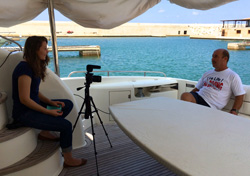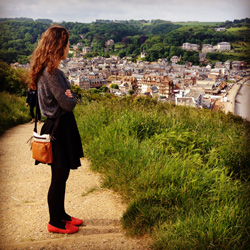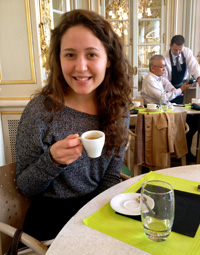Late film director Mike Nichols once said, “There’s nothing better than discovering, to your own astonishment, what you’re meant to do. It’s like falling in love.”

For Laila Knio ‘17, a psychology major and French minor, a series of experiences over the past year sparked her desire to prepare for a future medical career. She hopes to help those in great need of medical care, both in the U.S. and overseas.
“The way I see it, the similarity between all medical fields is that the work is so people-centered,” said Knio. “I want to spend my time as an undergraduate learning the most that I can about people, about our complexities and our minds in relation to our behavior, to hopefully become the best doctor that I can be.”
Knio put this philosophy into practice this past summer, when she traveled back to Lebanon, her birthplace and home of ten years, to film a documentary.
The as-yet untitled documentary focuses on the stories of “extraordinary people who have helped others despite religious or ethnic differences.” Knio spent half of her three-week trip interviewing individuals who were on the ground during the country’s shocking and widely publicized civil war.
“I speculated that its relatively recent civil war may have catalyzed individuals to help those who are different than themselves,” said Knio. “Sometimes war can be the ultimate equalizer.”
Among others, she spoke with a Muslim Sheikh whose family provided flour to a blockaded Christian town, an individual who founded a nonprofit ambulance service, and a rescue diver who is, to date, the sole Arab to receive the Albert Pierce Medal of Heroism.
“The plan was for four other Park Scholars from my class and myself, along with one of our Park Faculty Scholars, to travel to Lebanon this past summer to begin filming,” said Knio. “Unfortunately, because of increasing political turmoil, I was the only one able to go.”
On top of the absence of friends and mentors, Knio faced another difficulty – becoming a self-taught filmmaker. She acquired the necessary filming equipment just a few days before leaving for Lebanon, which meant limited time to experiment with the medium.
“It quickly turned into learn-by-doing, and I read up on anything that I didn’t understand,” said Knio. “In the span of a few days I must have watched every video out there about filming.”
As her family currently resides in Lebanon, Knio was fortunate to have housing and transportation – resources that many budding filmmakers struggle to secure when shooting in a foreign country.
Knio’s documentary is in its early phases of editing. Her next step is to reach out to NC State’s newly-endowed Moise A. Khayrallah Center for Lebanese Diaspora Studies to seek out collaboration and potential screening opportunities for the project. Knio also has ambitions to expand the documentary into a multinational series, with compelling stories from individuals in Brazil and India.
As her minor and creative endeavors suggest, Knio continually strives to obtain a more well-rounded global perspective. In addition to her time spent in Lebanon this past summer, she participated in a study abroad program based in Lille, France.
“It was a truly magnificent experience,” said Knio. “We spent a week in Paris, then traveled up to Normandy. We visited Omaha Beach on D-Day’s 70th anniversary, and the monastery at the top of Mt. Saint Michel, a small island commune. We spent a night in the beautiful, small port town of Honfleur, and saw the cliffs that Monet painted at Étretat. We spent the weekends traveling, so I had the chance to see Brussels, Ypres, and Bruges in Belgium, as well as Amsterdam in the Netherlands.”
Knio discovered the best way to experience city of Lille – and Europe in general – was by doing homework in cafés. There she could strike up conversations with locals curious enough to approach her.
“I experienced the greatness of dinners that last for two hours, and learned what it was like for an entire town to close at lunchtime,” said Knio.
The learning experience at the Université Catholique de Lille also proved to be starkly different from that to which Knio has grown accustomed at NC State. Classes lasted six hours every day, with a break at mid-day for lunch. Technology was minimal.
“We had discussions in class that were so engaging that I often lost track of the fact that I was speaking in a foreign language,” said Knio.
Her increasing fluency in French is motivated, in part, by Knio’s interest in working as a physician in a Francophone country in the future.
But without the support of the Park Scholarships community, Knio may not have committed to the path of pre-medicine.
“I remember sitting down and chatting with [Park Scholarships director] Eva Feucht last spring, when I was making the decision to switch out of textile engineering and pursue psychology with a pre-med track,” recalled Knio. “I was having an existential crisis, and she helped me clarify the reasons why I wanted to be a physician, which reaffirmed my change in course.”
Feucht also introduced Knio to Randall Williams, an OB-GYN physician who travels monthly to Iraq as part of a broader project to reform the country’s medical system. Williams now mentors Knio as she pursues becoming a doctor herself.
“I was blown away by how humble [Williams] is about his work,” said Knio. “He doesn’t see himself as Superman with a capital ‘S,’ swooping in to do what no one else can. He sees it as doing what is necessary, as if passing over the chance to help was never an option. He was pinpointed as having the knowledge and skill needed to help, and so that’s exactly what he did. I guess that’s why he’s my hero.”
Knio believes the Park Scholarships program excels at providing “opportunities to become inspired, whether professionally or personally.” Sometimes both.
For those similarly daunted by the prospect of pursuing a career in medicine, Knio suggests volunteering at a clinic or hospital to gain exposure to a medical environment, recording one’s “light bulb moments” in a journal, and reading inspirational books. Two of her favorites are Paul Austin’s Something For the Pain: Compassion and Burnout in the ER and Atul Gawande’s Complications: A Surgeon’s Notes on an Imperfect Science.
When she gets to medical school, Knio would like to explore specialties in pediatrics, neurology, psychiatry, or primary care. In the meantime, she plans to apply for the Brody-Park internship, which allows Park Scholars to shadow physicians and medical students at East Carolina University’s Brody School of Medicine.
Story by Lauren Vanderveen
posted 2014.12.30

